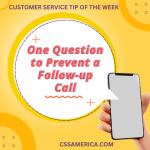
I think that’s not going to be feasible. I think we can do that. I think you’re on the right track. Methinks thou dost protest too much.
Please forgive the Shakespearean reference, but it seems to fit well here. When we are talking to co-workers and customers, and we’re giving our opinion or sharing some information or knowledge, the other person knows we’re speaking. The other person knows the news is coming from us. However, many of us feel the need to put the phrase “I think” in front of a lot of what we say. We feel the need to say something like “from my perspective” before we give our perspective.
And while it may be accurate wording, it’s often unnecessary. And it’s not only unnecessary, but it can reduce the credibility of the statement, the strength of the word, and the confidence the customer has in what you’ve said.
Let’s repeat what’s at the top: I think that’s not going to be feasible. I think we can do that. I think you’re on the right track. Methinks thou dost protest too much.
Now compare without “I think” included: That’s not going to be feasible. We can do that. You’re on the right track. Thou dost protest too much.
The “I think” leaves doubt, and – if there’s no room for doubt – you’re creating uncertainty unnecessarily. If you say I think that’s not going to be feasible, the other person could ask if you could check just to make sure.
If you say I think we can do that, then the customer may ask if they could talk with someone who can confirm whether it can be done.
If you say I think you’re on the right track, the customer may ask what they should do differently.
By creating doubt, you could be lengthening the conversation and creating more work for you or your co-workers. You could be curtailing customer confidence when you want them to support your conclusion or suggestion.
If there is no doubt, eliminate “I think” to build customer confidence.
Signup for FREE Tips! Contact Us More Resources for You Visit Our Home Page























